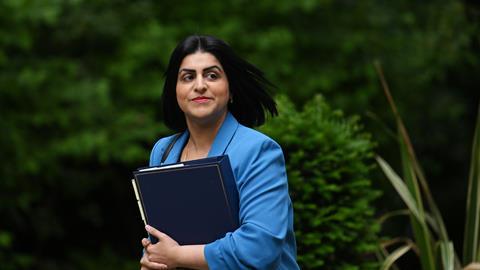The lord chancellor today entered the continent-wide debate over the future of the European Convention on Human Rights by calling for 'a shared political endeavour' of reform. In a speech in Strasbourg, Shabana Mahmood said that, while the UK is 'resolutely committed' to the 1950 convention, 'the trust of the public is beginning to erode as the application of rights feels out of step with common sense'.
Mahmood was speaking after nine EU governments published an open letter to the 46-member Council of Europe calling for reform of the European Court of Human Rights. The court's interpretation of the ECHR 'has resulted in the protection of the wrong people and posed too many limitations on the states’ ability to decide whom to expel from their territories', the governments said.
Read more
In an apparent reference to the letter, Mahmood told the CoE's committee of ministers: 'Across Europe, public confidence in the rule of law is fraying. There is a growing perception – sometimes mistaken, sometimes grounded in reality – that human rights are no longer a shield for the vulnerable, but a tool for criminals to avoid responsibility. That the law too often protects those who break the rules, rather than those who follow them.'
She said that the UK government is already committed to legislation to clarify the law around the convention's Article 8, 'which many foreign offenders have exploited in order to avoid deportation'.
However Article 8 has too often been used in ways that frustrate deportation, even where there are serious concerns about credibility, fairness, and risk to the public, she said. For example prisoners claiming a right to socialise under Article 8 'is not just a legal stretch. It damages the public perception of human rights altogether'.
Convention reform must be 'a shared political endeavour among us as member states, Mahmood said. 'The European Convention on Human Rights is one of the great achievements of post-war politics. It has endured because it has evolved. Now, it must do so again.'
Mahmood's Strasbourg speech - heavily promoted by the Ministry of Justice - is unlikely to assuage domestic critics. Earlier this month Conservative leader Kemi Badenoch announced the setting up of a commission under Lord Wolfson of Tredegar (David Wolfson KC) to examine the question of ECHR withdrawal.
Professor Richard Ekins, head of thinktank Policy Exchange's Judicial Power Project, said: 'The government’s newfound enthusiasm for ECHR reform is a welcome development. However, any serious attempt at reform has to address the flaw at the heart of European human rights law, which is the Strasbourg Court’s conceit that the ECHR is a “living instrument”. Meaningful ECHR reform has to tackle this doctrine and the case law to which it has given rise.'
This article is now closed for comment.




























23 Readers' comments